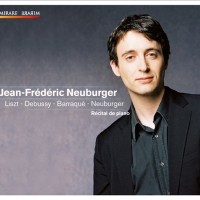Neuburger’s live Barraqué Sonate
|
Walt Mundkowsky [May 2013.] Franz LISZT: Funérailles (“October 1849,” from Harmonies poétiques et religieuses). Jean-Frédéric NEUBURGER: Maldoror (2010). Jean BARRAQUÉ: Sonate pour piano (1950-52). Claude DEBUSSY: Et la lune descend sur le temple qui fut (from Images II, 1907). (Rec. live at Cité de la musique, Paris, Jan. 14, 2011.) Jean-Frédéric Neuburger (pno). Mirare MIR 145 (http://www.mirare.fr/). Distributed in the US by Harmonia Mundi (http://www.harmoniamundi.com/). I like the idea of a gifted non-specialist tackling the vast Barraqué Sonate at barely 24 – the age Barraqué was when he finished it. Wanting to focus on that, I bypassed Jean-Frédéric Neuburger’s program, which places it third. His 38:41 duration is quicker than Chen’s (telos) or Henck’s (ECM) but never feels rounded off or rushed. Sharper distinctions could’ve been made between the style rigoureux and style libre material, but Neuburger’s way is a choice (“For [Barraqué], the spirit must take precedence over the letter”). The final movement, where differences of this sort fade, is exceptionally gripping. He has the technique and intellect required to spin out the work in a single cohesive stroke. As with Marc-André Hamelin on occasion, though, the lack of strain isn’t all to the good. Close miking highlights Neuburger’s spare pedaling and other fine details; the audience seems distant. Applause has been retained. Would that Neuburger had emulated Evgeni Koroliov. As Kevin Bazzana reported, “At a sparsely attended noon concert in a small venue [Glenn Gould Festival Groningen, ’92] Koroliov came out, looking deadly earnest, all in black, sat down, played The Art of Fugue, got up, and left.” Two Barraqué Sonate recordings currently in limbo would change things if available: a) Roger Woodward’s The London Music Digest from the Round House (1972, 2 LPs), EMI EMSP551. Perhaps Celestial Harmonies, his current label, can be persuaded. b) Nic Hodges’ scintillating account of Heribert Henrich’s revision of the score at Sophiensæle Berlin (Jan. 26, 2012), unreleased. (I have a FLAC copy on disc.)
[More Walt Mundkowsky]
[More
Barraqué]
[Previous Article:
Scardanelli’s Other April Motley]
[Next Article:
Can These Bones Live? </br>Conservatoire Blues]
|
